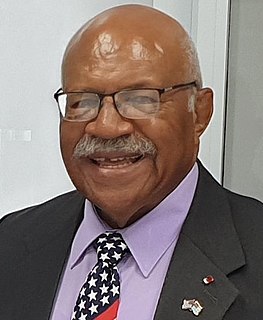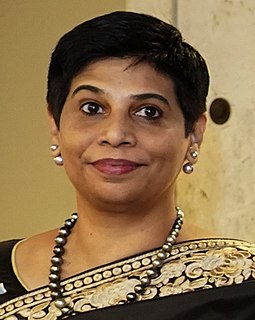Related Research Articles
The Republic of Fiji Military Forces (RFMF) is the military force of the Pacific island nation of Fiji. With a total manpower of 3,500 active soldiers and 6,000 reservists, it is one of the smallest militaries in the world, though most of its surrounding island nations have no militaries at all. The Ground Force is organised into six infantry and one engineer battalions, with approximately 6,000 reserves. There was formerly one "Zulu" company of counter-revolutionary specialists, which was deactivated in late 2000 due to a mutiny by some of its members.

The United Fiji Party was a political party in Fiji. It was founded in 2001 by Prime Minister Laisenia Qarase as a power base; it absorbed most of the Christian Democratic Alliance and other conservative groups, and its endorsement by the Great Council of Chiefs (Bose Levu Vakaturaga) caused it to be widely seen as the successor to the Alliance Party, the former ruling party that had dominated Fijian politics from the 1960s to the 1980s. It draws its support mainly from indigenous Fijiians.

Adi Koila Mara Nailatikau is a Fijian lawyer, who has served as a diplomat and politician. She was also First Lady of Fiji from 2009 until 2015, as the wife of Ratu Epeli Nailatikau, the President of Fiji.

The president of Fiji is the head of state of Republic of Fiji. The president is appointed by the Parliament for a three-year term under the terms of the 2013 Constitution of Fiji. Although not entirely a figurehead, the role of president in the government is largely ceremonial, but there are important reserve powers that may be exercised in the event of a crisis. In addition, the president is the commander-in-chief of the Republic of Fiji Military Forces.

Sitiveni Ligamamada Rabuka, OBE, MSD, OStJ, is a Fijian politician best known as the instigator of two military coups in 1987. He was later democratically elected as Prime Minister of Fiji, serving from 1992 to 1999. He went on to serve as Chairman of the Great Council of Chiefs, and later served as Chairman of the Cakaudrove Provincial Council from 2001 to 2008. He was elected to this position on 24 May 2001 and re-elected for another three-year term on 13 April 2005.

Josaia Voreqe Bainimarama, commonly known as Frank Bainimarama, is the 8th and current prime minister of Fiji since 2007. A member of the Fiji First Party, he began his career as a naval officer and commander of the Fijian Military Forces.
Taniela (Daniel) Vafo'ou Fatiaki CF was the Chief Justice of Fiji from 1 August 2002, when he succeeded Sir Timoci Tuivaga, till 5 December 2008. As Chief Justice, he presided over both the High Court and the Supreme Court, but was constitutionally barred from presiding over, or even sitting on, the Appeal Court. On 3 January 2007, he was sent on leave by the Republic of Fiji Military Forces, which had seized power on 5 December 2006. On 19 January, he was formally suspended, pending an investigation into allegations of misconduct. This investigation was dropped in December 2008 as part of a deal that involved his formal resignation.

The chief justice is Fiji's highest judicial officer. The office and its responsibilities are set out in Chapter 5 of the 2013 Constitution of Fiji. The Chief Justice is appointed by the President on the advice of the Prime Minister
Sir Timoci Uluiburotu Tuivaga was a Fijian judge, who served as Chief Justice from 31 March 1980 to 31 July 2002, when he retired. He was Fiji's first native-born Chief Justice.
Graham Everett Leung is a Fijian lawyer and former president of the Fiji Law Society. He was also chairman of the Electoral Commission, and was named as judge advocate of a Court Martial panel to retry 20 soldiers convicted mutiny in relation to the Fiji coup of 2000, but a number of complications left his commissioning in that office outstanding until he was finally approved as judge advocate and commissioned as an army officer with the rank of lieutenant colonel on 4 January 2006.

In the early 2000s, Prime Minister Laisenia Qarase's government proposed legislation to establish a Commission with the power, subject to presidential approval, to pardon perpetrators and compensate victims of the coup d'état against the elected government of Mahendra Chaudhry in 2000. Most Fijian politicians outside of the government came out against proposed legislation Along with many politicians, the Military and a number of business and professional organizations also came out against the bill. The campaign derived its name from the yellow ribbons promoted by the opposition United Peoples Party and worn by many citizens, as a sign of their opposition to the legislation.

The "Blue Ribbon campaign" was the name for the campaign promoting support for the controversial legislation introduced by the Fijian Government in 2005 to establish a Reconciliation and Unity Commission. The name specifically comes from the blue ribbons promoted by the ruling United Fiji Party as a sign of support for the bill. This campaign had the strong support of Prime Minister Laisenia Qarase, Attorney General Qoriniasi Bale, and other members of the ruling coalition and was warmly welcomed by imprisoned coup instigator George Speight. The proposed Commission was intended to have the power to grant compensation to victims, and amnesty to perpetrators, of the coup d'état which deposed the elected government in May 2000.
The Fiji Law Society is the official body that registers and regulates the activity of all lawyers in Fiji. Historically, the President of the Fiji Law Society was a member ex officio of the Judicial Service Commission.

The tension between Fiji's government and Military forces, which had been simmering for more than two years, appeared to escalate in late December 2005. Tension between the government and the Military had been simmering throughout the year, with Commodore Bainimarama and other Military officers making strongly worded public statements opposing certain government policies, including the early release from prison of persons implicated in the Fiji coup of 2000, and the government's promotion of controversial legislation to establish a Commission with the power to grant amnesty to perpetrators of the coup.

The Fijian coup d'état of December 2006 was a coup d'état carried out by Commodore Frank Bainimarama, Commander of the Republic of Fiji Military Forces, against the government of President Josefa Iloilo. Iloilo was removed as president, but he was later reinstated by Bainimarama on 4 January 2007. The coup occurred as a continuation of the pressure which had been building since the military unrest of the 2000 Fijian coup d'état and 2005–06 Fijian political crisis.
Laisa Digitaki is a Fijian businesswoman, originally from Moala Island in the Lau Archipelago.

Anthony Harold Cumberland Thomas Gates was the chief justice of Fiji from 2008 to 2019. Justice Gates is best known for his decision in Chandrika Prasad v. Att-Gen of Fiji [2000] 2 FLR 89; Prasad v. Republic of Fiji & Another [2001] 1 LRC 665; [2001] NZAR 21 in which he held that the Constitution of Fiji had not been abrogated by the military intervention in 2000, and that the Constitution continued to be the law of the land. His decision was upheld by Fiji’s Court of Appeal, in February 2001. However, the decision which should have led to the restoration of the Parliament suspended by the coup of 2000 was not obeyed by the government at that time, the Government instead choosing to call for a vote in 2001.

Nazhat Shameem is a Fijian diplomat and former judge serving as the Permanent Representative of Fiji to the United Nations since 2014. She was also the President of the United Nations Human Rights Council in 2021.
Angenette (Angie) Heffernan is a Fijian human rights and democracy activist and Executive Director of the Pacific Centre for Public Integrity (PCPI). Prior to PCPI she was a prominent regional environmental political campaigner for Greenpeace Australia for eight years. She established the Pacific Centre for Public Integrity with Suliana Siwatibau and social justice campaigner Aisake Casimira to combat perceived corruption and bad governance in the Pacific region, She is known for her strong stance against political and state corruption and recently for her outspoken opposition to the coup d'état carried out by the Republic of Fiji Military Forces on 5 December 2006.
Ratu Rakuita Saurara Vakalalabure is a Fijian lawyer and former politician. He was first elected to the House of Representatives in 1999 and following the elections after the 2000 political upheavals was a candidate of the Conservative Alliance (CAMV). He was re-elected to the House of Representatives, winning the Cakaudrove West Fijian Communal Constituency in the parliamentary election of 2001, following in the footsteps of his father, Ratu Tevita Vakalalabure, who claimed to hold the chiefly title of Vunivalu of Natewa, in Cakaudrove Province, and who served in both houses of Parliament from the 1970s to the 1990s. He was subsequently appointed Deputy Speaker of the House of Representatives, but on 5 August 2004, he was sentenced to six years' imprisonment for his role in the Fiji coup of 2000, however the sentence was successfully reduced on appeal.
References
- ↑ "List of Legal Practitioners with valid Practising Certificate as at 5th November 2020 for the period 01st March, 2020 – 28th February, 2021" (PDF). 2021.
{{cite web}}: CS1 maint: url-status (link)